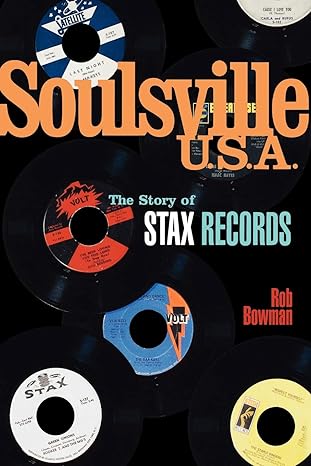Rob Bowman - Soulsville U.S.A. (1997)
 I'm sure it's a good bet to say that Rob Bowman's Soulsville U.S.A. is the most comprehensive book
ever written about the legendary Stax Record company of Memphis, TN. Many
people consider him the ultimate authority on this long defunct label that
closed in 1975 due to bankruptcy.
I'm sure it's a good bet to say that Rob Bowman's Soulsville U.S.A. is the most comprehensive book
ever written about the legendary Stax Record company of Memphis, TN. Many
people consider him the ultimate authority on this long defunct label that
closed in 1975 due to bankruptcy.
Bowman is a Canadian born music writer who completed a PHD in ethnomusicology
at the University of Memphis in 1993. In addition to this detailed history of
Stax he won a grammy for his lengthy liner notes written for a box set of
Stax-Volt singles in 1996.
The book tells the tale of how Jim Stewart, a white, country
music fan started a record company that in the 1960s became second only to Motown
as a label offering rhythm and blues almost exclusively.
The company's name came from combining the first two letters of its founder's
last name with the first two letters of his sister's last name. She was Estelle Axton,
who eventually became a major Stax-Volt investor and second in command at the
company.
In its early years the organization took pride in its family atmosphere. The totally integrated company worked with genuine
friendship and respect for each other. Booker T. and the MGs were a quartet
that had two black members, Booker T. Jones on organ and Al Jackson Jr. on
drums. The rest of the band featured white musicians Steve Cropper on guitar and Donald "Duck"
Dunn on bass. All four were considered virtuosos who made their own records in
addition to being the label's house band that played on almost every Stax
recording.
The Memphis label's early roster not only included the MGs, it had Rufus Thomas and his daughter Carla, the Bar-Kays, Sam and Dave, Eddie Floyd,
and most importantly, Otis Redding. Later, the featured headliners were Isaac
Hayes and The Staple Singers.
The book takes readers on a trip through the racial environment of the 1960s and details how the
assassination of Martin Luther King adversely affected both the friendships and the business.
Al Bell - who joined Stax while it was still owned by Stewart and Axton - eventually purchased the company in full, and he was very aggressive in expanding
Stax's operations into films, concerts and other ventures. He made some well-meaning but
questionable business decisions with Gulf and Western and later CBS that
severely hurt the label's bottom line.
Bowman wrote that Bell's over-expansion mistakes weren't helped by the Memphis
political, business and civic leaders who were unhappy that Stax had become a one
hundred percent black owned enterprise.
Under its original ownership Stewart also made an almost fatal blunder that allowed
Atlantic Records to take control of Stax's entire back catalog
when a distribution deal between the two companies ended. Stewart admitted he
never read the contract.
The book is 386 pages of small print so it's a rather lengthy read. Unless
you're a major Stax fan or someone who needs to know every minute detail, it
provides way more information than most readers will ever need or want to know. The
last quarter of the book becomes tedious as it mostly discusses the business
side of Stax, detailing the many legalities, contracts, business decisions and loan percentage rates that sent the label into bankruptcy. I found myself skimming much of the ending.
Bowman should be complimented on the amount of work involved to complete this
tome. It's apparent that writing it was truly a labor of love for him, but in my view,
some editing and less dry, encyclopedic writing - there is a massive number of
footnotes - would have helped, especially when it came to Stax's
sad downfall and eventual closure.
Comments
Post a Comment